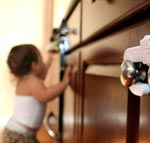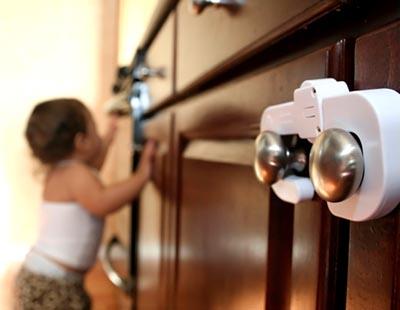Young guests in your house: childproofing
Arabella Youens has a few basic recommendations for making sure your property is fully prepared for younger guests this Christmas


Exquisite houses, the beauty of Nature, and how to get the most from your life, straight to your inbox.
You are now subscribed
Your newsletter sign-up was successful
New parents seem to acquire a range of skills subliminally-from the art of funnelling food from plate to mouth over the top of a sleeping newborn's head while she's strapped to your front in a BabyBjorn to growing eagle eyes in the back of your head from the moment a child is mobile. Of course, these skills, like any muscles, require exercising to be kept finely tuned, so it's understandable that, by the time you're at the stage when you're welcoming your children's children into your home, you might have become a little rusty.
As I'm frequently reminded by my parents, the way we bring up children these days is dram-atically different to the way we were brought up, and the phrases ‘being wrapped in cotton wool' and ‘overprotective parenting' are often repeated (this is normally followed by tales of childhoods spent in plaster casts from falling out of trees). Be that as it may, there are still a few measures worth put-ting in place, or at least considering, before you host little ones over the Christmas period. However, before you invest in new kit, it's worth having a talk with the mother of the child.
I know of one grandmother who was suddenly put off having her granddaughter to stay by herself when a friend innocently enquired whether she had enough plastic coverings to protect each and every wall socket in the house-a quick call to the mother would have established that there was no need for these, as the child had zero interest in sockets. Obviously, there's no substitute for constant supervision, but this isn't always practical or possible. Here are some elementary precautions you can take, with no cotton wool involved.

Stair gates Depending on the age and ability of the child, it might be worth investing in a pair of stair gates to go at the bottom of the stairs (no need to put them at the top as well). The pressure-mounted ones mean that you don't need to drill any holes to hold the brackets in place, but they won't work if the bannister to which you're attempting to attach them isn't a flat surface. If the child can't get upstairs unsupervised, then a whole host of potential problems are removed, such as heads being pushed through bannisters, which tend to have wider gaps in older houses than building regulations would allow today.
Kitchen Drawers filled with kitchen implements that are within easy reach are often a source of great fascination for toddlers, so it's worth having a quick think about any sharp objects that might be stored in them that you can move elsewhere temporarily. The same is true of the cupboard underneath the sink, which is usually full of toxic cleaning products. You can buy special door locks from most DIY stores, but, depending on whether the handles will allow it, it might be just as easy to secure a rubber band around them to prevent them from being opened wide enough to allow access. Be sure that any kettle or appliance leads aren't within grabbing reach.
Sitting room Again, think about what might be found in drawers or easily accessed cupboards, such as sewing scissors or letter openers. Open fireplaces and match-boxes are a natural hazard, so keep the fireguard on at all times and matches safely on the mantlepiece. A quick way to reduce the danger of any glass coffee tables with sharp corners is to cover them with a thick blanket, and perhaps a tablecloth. Sure Start Children's Centres sells plastic corners that you can slip onto tables, but they can easily be pulled off or get snagged on clothing.
Bedrooms Keep all low-lying windows and any balcony doors closed. Don't put a cot or cot-bed near any curtain or blind cords as babies' heads can get trapped in these, with disastrous consequences. It's worth hooking these up out of reach for the duration of the stay-some go as far as to say that it's worth cutting the loop in the cord into two strands.
Exquisite houses, the beauty of Nature, and how to get the most from your life, straight to your inbox.
Gardens If ponds and pools can't be fenced off, then there's no alternative to constant supervision whenever the child is outside. Keep garden sheds and greenhouses locked for as long as they're with you.
Finally... The Child Accident Prevention Trust has lots of advice and child-proofing tips on its website (http://capt.org.uk) tailored to the age of the child (from babies through to early teenagers).

